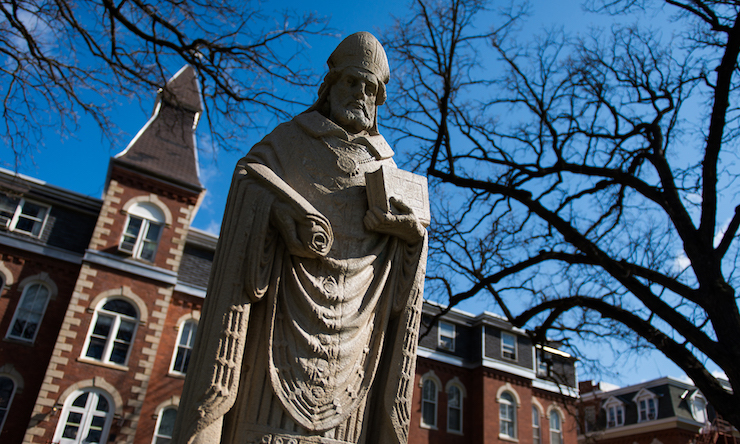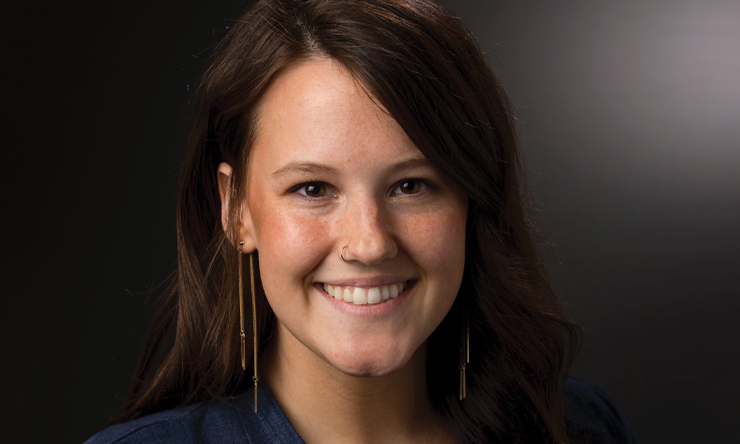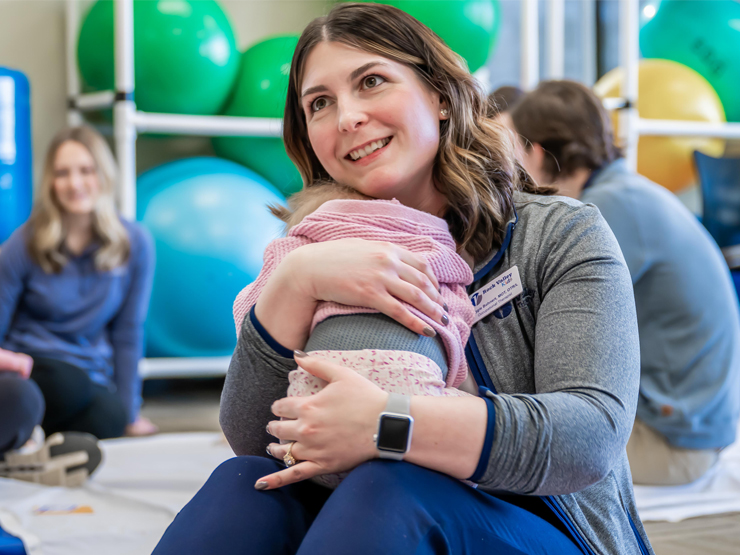Scene Magazine | Fall 2018
Please note: This article was current as of December 2018
More than 8,100 master's and doctoral degrees have been conferred by St. Ambrose since the introduction of the H.L. McLaughlin MBA program in 1977.
The MBA stood for a decade as the school's lone graduate program, but, ultimately, its introduction transformed a small private Catholic college grounded in the liberal arts into a well-regarded university with international reach and reputation.
Today, St. Ambrose offers 13 master's degrees and three doctoral degrees. And there are more to come.
As vice president for strategic initiatives, Sandra Cassady, PT, PhD, has helped guide three new graduate degree programs into existence since 2016. A 14th master's program – a Master of Science in Criminal Justice (MSCJ) – will be added to the catalog next fall.
"I think it was very wise when previous administrations decided to pursue graduate programs at St. Ambrose," Cassady said. "Having master's and doctoral degrees in addition to a robust number of undergraduate programs not only diversifies our offerings-and we know that's very important in today's competitive environment-but it also is part of what makes us a comprehensive university."
Since Sister Joan Lescinski, CSJ, PhD, became president in 2007, St. Ambrose has added five new graduate programs and transitioned the occupational therapy program from a master's degree into the university's third doctoral offering.
"What we have done over the decades since we first began graduate education is to keep our ears to the ground to discern what kinds of professional programs people may need," Sister Joan said. "We continually reach out to meet needs."
Meeting professional and community needs has been a hallmark of graduate education at St. Ambrose since the MBA was introduced to meet a need for advanced education within the regional business sector-specifically for employers such as John Deere, the Rock Island Arsenal, and Case IH.
The Master of Organizational Leadership program grew from a request by the Department of Defense and was taught for years by SAU faculty on Arsenal Island.
Occupational therapy debuted as an undergraduate degree after a call came from local hospital leaders about a growing need for therapists. From that request, what is now the Doctor of Occupational Therapy (OTD) program evolved. The Doctor of Physical Therapy (DPT), Master of Social Work (MSW), Master of Speech-Language Pathology (MSLP), Master of Physician Assistant Studies (MPAS), Master of Public Health (MPH), and Master of Science in Exercise Physiology (MSEP) followed.
SAU Provost and Vice President for Academic Affairs Paul Koch, PhD, said the university's mission to supply an education grounded in the liberal arts also has seamlessly been integrated into graduate programs.
"While they may be professional in nature, our graduate programs really reflect an understanding of the value of good communications skills, problem-solving skills, and critical-thinking skills," he said. "We hear that from the people who employ our graduate students-that our graduates have those abilities in ways that aren't necessarily reflected in graduates from other universities."
The university's core mission values are central to every program and impact virtually every student.
"I am convinced SAU developed me intellectually, spiritually, ethically and socially," said Alexander Bonilla, who earned his MBA in 2018 after completing his undergraduate degree in Texas. "The classroom was always challenging, the faculty was engaged and dedicated, the students in my classes were top notch, and Mass at the Grotto on Wednesday evenings remains one of my favorite experiences. My experience at St. Ambrose certainly enriched my life."
The St. Ambrose commitment to service and social justice also fits naturally into the curricula of SAU graduate programs.
In the College of Health and Human Services, the MSW, DPT, OTD, and MSLP programs conduct in-house clinics that provide experiential learning for the students as well as pro bono care to people in the community who otherwise couldn't afford the help.
MPAS students work with a local learning center to provide education on best home health care practices to immigrant families. The MOL, MBA and MAcc programs all include a focus on assisting nonprofit organizations.
"I don't know that we have a requirement to include service in the curriculum," Koch said. "It is just part of who we are as an institution."
Graduate Degrees at SAU
As graduate degrees become essential to more professions, keeping graduate education affordable and accessible for busy, working adults remain St. Ambrose priorities.
Convenience, Affordability Enhanced
As graduate degrees become essential to more professions, keeping graduate education affordable and accessible for busy, working adults remain St. Ambrose priorities.
This year, the MBA is being offered online, along with the Master of Criminal Justice (MCJ) and newly introduced MPH degree programs. Classwork through these programs can be accessed and completed on the student's own schedule-taking the convenience factor for busy working adults to another level.
The fully online menu will expand in the years ahead while St. Ambrose continues to offer hybrid courses featuring a combination of online and seated coursework in programs such as the MBA, MOL, MSW, Master of Early Childhood Education (MECE), and Master of Educational Administration (MEA).
Advanced degrees have become the entry-level industry standard for most health science-related professions, meanwhile, making full-time, daytime courses essential to many graduate programs at the SAU Center for Health Sciences Education at Genesis.
To offset expenses, the DPT introduced Track I and Track II opportunities for forward-looking undergraduate students, allowing more than 15 students each year to earn both their undergraduate and graduate degree at SAU in fewer years and with less expense.
Programs such as the Master of Social Work (MSW) and Master of Science in Information Technology Management (MSITM) also offer pathways for students to integrate undergraduate and graduate studies and finish sooner at less cost.
"We might be seeing more of that," said Cassady, who serves as dean of the College of Health and Human Services in addition to her VP role. "Affordability is a theme across all of these efforts. If a student has an efficient plan of study, they will pay for one less year of tuition and living expenses, and it gets them into the workforce a year earlier."
Current Student Government Association President Emily Studt is a Track I DPT student in her bridge year. She said she will earn her Bachelor of Science in Kinesiology degree and her doctoral degree in a combined 5½ years. A similar course of study at another institution would have taken six years-plus, she said.
"Just the saving of time is a really awesome feature," she said of getting a head start on her career.
As for simultaneously being an undergraduate senior and a first-year doctoral student, Studt said, "It's a lot. I'm in class 35 hours a week. And then I'm in student government, so that takes a little time as well. But I've always enjoyed being busy. I want to get the most of my experience at St. Ambrose, so I'm taking advantage of everything I can."
The Future of Graduate Education
In his first year as Dean of Graduate Studies, Michael Puthoff, PT, PhD, sees opportunities for graduate programs to evolve in tandem with emerging technologies that will change the way business gets done and clients and patients get served.
"I think it's important that programs be nimble, that they respond to changes in the workplace and professional world," he said. "The opportunity to piece together a graduate education is going to grow in importance, where you can say I want this focus and that focus. You can stack different parts of a graduate education together."
St. Ambrose already has taken the lead in that regard, offering affordable and less time-consuming means of pairing an MBA degree with an MSW, MPH, or MOL degree. MSW students also can pursue a dual degree through the MPH. Other such possible synergies are being studied.
Health science graduate programs, meanwhile, are piloting team-oriented, person-centered models of health care delivery that are just beginning to emerge in the industry.
"Inter-professionalism and interdisciplinary programs, I think, are the degree programs that will be most successful," Puthoff said.
In its first year, the MPH is a template for just such a collaborative program. "The classes are not necessarily taught by faculty in one department. Based on the topic, faculty from departments such as Kinesiology or Nursing may teach a course," Puthoff noted. "This collaboration also takes place in the MBA and MOL programs, where faculty from across the College of Business contribute to the curriculum. You can tap into expertise from across our university to build dynamic curriculums and not have to hire a whole department."
Puthoff believes advanced degrees will continue to grow in importance in the workplace, and he said St. Ambrose will stand ready to provide them.
How? In all the important ways that led Janet Sichterman to turn to St. Ambrose again and again and again, of course.
"Our classes are student-centered," Puthoff said. "The faculty really want to help those students grow."
– Craig DeVrieze '16 MOL
Share This Story




